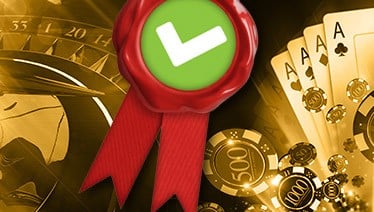When you signed into your online casino to play games, what did you check? The games lobby? The bonuses? The mobile app? Those are the types of amenities that most casino players look for before they open an account.
Casino advisors caution players to check one more thing – the casino’s license. The license that a casino holds indicates how experts rate the venue. Obtaining an online casino license requires that the casino prove that it’s a safe and secure online gaming site, that the games and payouts are monitored and that there’s an outside official body that supervises its random number generator and any player / casino disputes.
The next time you get ready to sign up for a casino account, check out the casino’s license. You can find license information on the casino’s homepage footer or by searching under the name of the casino + the word “license.”
Casino Licensers
There are a number of countries that license offshore casinos through governmental bodies. For instance, on the islands of Antigua and Barbuda, the Financial Services Regulatory Commission's Division of Gaming handles licensing services including licenses for interactive gambling and for interactive wagering.
Antilles and Curacao offer gambling licenses for online poker rooms, sportsbooks and casinos. These countries award gambling licenses through sub-licensing from an existing gambling license holders or through the Department of Justice. Licenses from the Department of Justice. The Antilles and Curacao licenses last for two years.
Other countries that offer licensing services include Costa Rica, Malta, Panama, the Isle of Man, and Gibraltar.
About Casino Licenses
When you play for real money at an online casino, you want to be sure that your money is in good hands. That’s what a gambling license proves – it’s a digital certificate of authority that’s issued by a gaming control board. Any establishment that offers games of chance or games that involve wagering should hold a gaming license.
Each jurisdiction that issues gaming licenses has its own requirements but in general, they check that the casino’s random number generator is, in fact, random, that the casino fulfills its promises to pay out wins in an orderly fashion, that the casino’s games are those of a reputable and licensed gaming developer and that the casino interfaces with reliable, trustworthy, secure and regulated online banking institutions.
The license demonstrates a casino’s commitment to a fair gaming policy and indicates transparency in the security of the gaming software and in its business operations.
Pay Attention
Players usually don’t pay attention to casino gaming licenses but they should. When you set up an account at an online casino you share your personal details -- name, email address, date of birth, payment information and more. You often link your casino account to an online banking institution or give the casino your credit card number and security code. A licensed casino gives you the peace of mind to know that the site to which you’re sending this information will be used only for the purpose you intended.
Legality of Online Gaming
Online casinos submit to the licensing process in order to maintain their reputations and assure their customers that they offer a safe and secure gambling experience.
The countries where the players are located do not check the online casinos’ licenses since they don’t base the legality of online casino gaming on the casinos’ licenses. Each country has its own rules regarding offshore online casino gambling entertainment. It’s a good idea to check out your country’s laws to make sure that you are playing legally.
In most states in the United States, online gaming is technically illegal. However, in point of fact, prosecuting and convicting individual players is difficult because they're gambling from home. It’s illegal for a gambling site to operate within the United States but when a site’s offices and servers are located offshore, the question becomes more iffy.
Issues of jurisdiction and sovereignty make gambling laws more complicated. The Federal Wire Wager Act makes it illegal to use an electronic wire method to transmit bets to an area where gambling is illegal. That means that a casino based in Malta is breaking the law if someone located in the U.S. plays at their site. The government, however, doesn't have the legal authority to prosecute overseas. In addition, now that sports betting has been OK’d in several states, (and since much of sports betting takes place -- or will take place in the near future – online), the legality of online casinos in the U.S. seems more secure.
Regulation
Regulation is still an issue for online gamblers located in the U.S. The licensing boards in other countries have strict regulations and guidelines that ensure the casinos pay out as advertised, publish odds accurately, maintain fair random number generators and adhere to national standards. Players in the United States, for now, must rely on the licensing boards of other countries.


